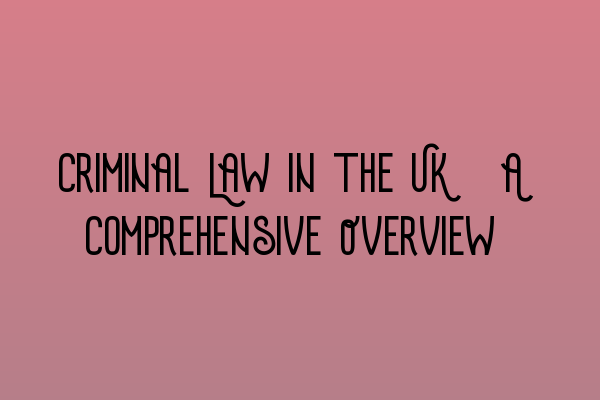Criminal Law in the UK: A Comprehensive Overview
Welcome to SQE Criminal Law & Practice Law UK, your go-to resource for comprehensive information on criminal law in the United Kingdom. Whether you are a law student, legal professional, or simply interested in understanding the basics of criminal law, this article aims to provide you with a comprehensive overview.
1. Understanding Criminal Law
Criminal law is a branch of law that deals with crimes and their punishment. It encompasses a wide range of offenses, including but not limited to murder, theft, assault, and drug offenses. The UK criminal justice system has its foundation in common law and statutory law, which sets out the rules and guidelines for prosecuting and sentencing offenders.
If you’re looking to practice criminal law in the UK, it is crucial to gain a solid understanding of its principles, including the burden of proof, the elements of a crime, and the various defenses available to defendants. Familiarize yourself with these concepts and their applications to ensure competent legal representation.
2. Criminal Law Procedure
The criminal law procedure in the UK follows a specific process from the initial investigation to trial and sentencing. It is essential to be familiar with each stage to navigate the legal system effectively. For a detailed guide on criminal law procedure, we recommend reading our article on SQE 2 Preparation Courses.
3. Key Legal Principles
Several key legal principles form the foundation of criminal law in the UK:
- Mens Rea and Actus Reus: To establish criminal liability, both the mental element (mens rea) and the physical act (actus reus) must be present.
- Principle of Strict Liability: In certain offenses, intent is not required for someone to be convicted. The defendant’s actions alone are sufficient for a guilty verdict.
- Burden of Proof: The burden is on the prosecution to prove the defendant’s guilt beyond a reasonable doubt.
- Presumption of Innocence: Every defendant is presumed innocent until proven guilty, and it is the prosecution’s responsibility to present the evidence.
- Right to Legal Representation: Every defendant has the right to legal representation, ensuring a fair trial.
4. Categories of Offenses
Crimes in the UK are broadly categorized into three groups:
- Summary offenses: These are minor offenses tried in a magistrates’ court, often resulting in a fine or community service.
- Triable either way offenses: These offenses can be tried either in a magistrates’ court or a crown court, depending on their seriousness.
- Indictable offenses: The most serious offenses are heard in a crown court and usually carry significant penalties, such as imprisonment.
5. Defenses and Sentencing
Defendants in criminal cases can present various defenses to challenge the prosecution’s case. These include self-defense, intoxication, duress, and mental impairment, among others. Understanding these defenses and their elements is crucial for building a strong case.
Once a defendant is convicted, the court proceeds to sentencing. Sentences can range from fines and community service to imprisonment, depending on the severity of the offense. For more information on sentencing guidelines, we recommend reading our article on SQE 1 Preparation Courses.
6. Stay Informed with SQE Criminal Law & Practice Law UK
SQE Criminal Law & Practice Law UK is committed to providing the most up-to-date and relevant information on criminal law in the UK. Stay informed by regularly checking our website for the latest articles, news, and updates.
For additional resources related to the SQE exams and legal practice, we recommend the following articles:
- SQE 1 Practice Exam Questions
- SQE 1 Practice Mocks FLK1 FLK2
- SQE 2 Preparation Courses
- SQE 1 Preparation Courses
- SRA SQE Exam Dates
Thank you for reading and trusting SQE Criminal Law & Practice Law UK as your guide to understanding criminal law in the UK. For any legal assistance or inquiries, do not hesitate to contact us.
